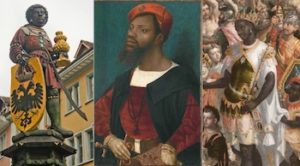
*The Moors community is celebrated on this date c 200. They were Muslims from the medieval era in Northwest Africa and the Iberian Peninsula.
This included present-day Spain and Portugal as well as the Maghreb and western Africa, whose culture is often called Moorish. Christian Europeans first used Moor to designate Muslims during the Middle Ages. The Moors were initially the indigenous Maghrebine Berbers of Africa. The name was later also applied to Arabs and Arabized Iberians. To some, Moors are not distinct or self-defined people. White Europeans of the Middle Ages and the early modern period variously applied the name to general geographic areas.
The 1911 Encyclopedia Britannica observed, "The term 'Moors' has no real ethnological value." The Sephardim or Sephardic Jews trace their descent from the Jews of this period. Jewish scholarship flourished alongside the Muslim academies. The term has also been used in Europe in a broader, somewhat offensive sense to refer to Muslims. During the colonial era, the Portuguese used the names "Ceylon Moors" and "Indian Moors" in South Asia and Sri Lanka, and the Bengali Muslims were also called Moors. In the Philippines, the longstanding Muslim community, which predates the arrival of the Spanish, now self-identifies as the "Moro people," an exonym introduced by Spanish colonizers due to their Muslim faith.
In 711, African troops, mostly formed by Moors from northern Africa, led the Umayyad conquest of Hispania. The Iberian Peninsula then became known in Classical Arabic as al-Andalus, which at its peak included most of Septimania and the territory mentioned above. In 827, the Moors occupied Mazara, Sicily, developing it as a port. They eventually went on to consolidate the rest of the island. The intellectual achievements of the Moors in Spain had a lasting effect; education was universal in Moorish Spain, while in Christian Europe, 99 percent of the population was illiterate, and even kings could neither read nor write.
At a time when Europe had only two universities, the Moors had seventeen, located in Almeria, Cordova, Granada, Juen, Malaga, Seville, and Toledo. In the 10th and 11th centuries, public libraries in Europe were nonexistent, while Moorish Spain could boast of more than 70, including one in Cordova that housed hundreds of thousands of manuscripts. Universities in Paris and Oxford were established after scholars visited Moorish Spain.
Differences in religion and culture led to a centuries-long conflict with the Christian kingdoms of Europe, which tried to reclaim control of Muslim areas; this conflict was referred to as the Reconquista. In 1224, the Muslims were expelled from Sicily to the settlement of Lucera, which was destroyed by white-European Christians in 1300. The fall of Granada in 1492 marked the end of (Moors) Muslim rule in Spain, although a Muslim minority persisted until their expulsion in 1609.